Fleurs du Mal Magazine


Or see the index
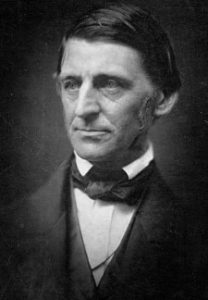
The Apology
Think me not unkind and rude,
That I walk alone in grove and glen;
I go to the god of the wood
To fetch his word to men.
Tax not my sloth that I
Fold my arms beside the brook;
Each cloud that floated in the sky
Writes a letter in my book.
Chide me not, laborious band,
For the idle flowers I brought;
Every aster in my hand
Goes home loaded with a thought.
There was never mystery,
But ’tis figured in the flowers,
Was never secret history,
But birds tell it in the bowers.
One harvest from thy field
Homeward brought the oxen strong;
A second crop thine acres yield,
Which I gather in a song.
Ralph Waldo Emerson
(1803 – 1882)
The Apology
•fleursdumal.nl magazine
More in: Archive E-F, Archive E-F, Emerson, Ralph Waldo, MONTAIGNE
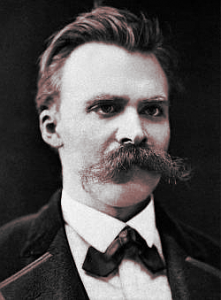
Das Wort
Lebendgem Worte bin ich gut:
Das springt heran so wohlgemut,
das grüßt mit artigem Geschick,
hat Blut in sich, kann herzhaft schnauben,
kriecht dann zum Ohre selbst dem Tauben
und ringelt sich und flattert jetzt
und was es tut, das Wort ergötzt.
Doch bleibt das Wort ein zartes Wesen,
bald krank und aber bald genesen.
Willst ihm sein kleines Leben lassen,
mußt du es leicht und zierlich fassen,
nicht plump betasten und bedrücken,
es stirbt oft schon an bösen Blicken –
und liegt dann da, so ungestalt,
so seelenlos, so arm und kalt,
sein kleiner Leichnam arg verwandelt,
von Tod und Sterben mißgehandelt.
Ein totes Wort – ein häßlich Ding,
ein klapperdürres Kling-Kling-Kling.
Pfui allen häßlichen Gewerben,
an denen Wort und Wörter sterben.
Friedrich Nietzsche
(1844 – 1900)
Das Wort
• fleursdumal.nl magazine
More in: Archive M-N, Archive M-N, Friedrich Nietzsche, Nietzsche
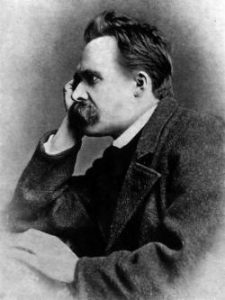
Das trunkene Lied
O Mensch! Gib acht!
Was spricht die tiefe Mitternacht?
»Ich schlief, ich Schlief -,
Aus tiefem Traum bin ich erwacht: –
Die Welt ist tief,
Und tiefer als der Tag gedacht.
Tief ist ihr weh -,
Lust – tiefer noch als Herzeleid:
weh spricht: Vergeh!
Doch alle Lust will Ewigkeit –
– Will tiefe, tiefe Ewigkeit!«
Friedrich Nietzsche
(1844 – 1900)
Das trunkene Lied
• fleursdumal.nl magazine
More in: Archive M-N, Archive M-N, Friedrich Nietzsche, Nietzsche

Vereinsamt
I. Die Krähen schrei’n
Die Krähen schrein
Und ziehen schwirren Flugs zur Stadt:
Bald wird es schnein. –
Wohl dem, der jetzt noch Heimat hat!
Nun stehst du starr,
Schaust rückwärts, ach! wie lange schon!
Was bist Du Narr
Vor Winters in die Welt entflohn?
Die Welt – ein Tor
Zu tausend Wüsten stumm und kalt!
Wer das verlor,
Was du verlorst, macht nirgends halt.
Nun stehst du bleich,
Zur Winter-Wanderschaft verflucht,
Dem Rauche gleich,
Der stets nach kältern Himmeln sucht.
Flieg, Vogel, schnarr
Dein Lied im Wüstenvogel-Ton! –
Versteck, du Narr,
Dein blutend Herz in Eis und Hohn!
Die Krähen schrein
Und ziehen schwirren Flugs zur Stadt:
Bald wird es schnein. –
Weh dem, der keine Heimat hat.
II. Antwort
Daß Gott erbarm’!
Der meint, ich sehnte mich zurück
In’s deutsche Warm.
In’s dumpfe deutsche Stuben-Glück!
Mein Freund, was hier
Mich hemmt und und hält, ist dein Verstand,
Mitleid mit dir!
Mitleid mit deutschem Quer-Verstand!
Friedrich Nietzsche
(1844 – 1900)
Vereinsamt
• fleursdumal.nl magazine
More in: Archive M-N, Archive M-N, Friedrich Nietzsche, Nietzsche

Ecce homo
Ja! Ich weiß, woher ich stamme!
Ungesättigt gleich der Flamme
Glühe und verzehr′ ich mich.
Licht wird alles, was ich fasse,
Kohle alles, was ich lasse:
Flamme bin ich sicherlich.
Friedrich Nietzsche
(1844 – 1900)
Ecce homo
• fleursdumal.nl magazine
More in: Archive M-N, Archive M-N, Friedrich Nietzsche, Nietzsche

An Goethe
Das Unvergängliche
Ist nur dein Gleichnis!
Gott der Verfängliche
Ist Dichter-Erschleichnis…
Welt-Rad, das rollende,
Streift Ziel auf Ziel:
Not – nennt′ s der Grollende,
Der Narr nennt′ s – Spiel…
Welt-Spiel, das herrische,
Mischt Sein und Schein: –
Das Ewig-Närrische
Mischt uns – hinein!…
Friedrich Nietzsche
(1844 – 1900)
An Goethe
• fleursdumal.nl magazine
More in: Archive M-N, Archive M-N, Friedrich Nietzsche, Goethe, Johann Wolfgang von, Nietzsche

Dem unbekannten Gott
Noch einmal, eh ich weiterziehe
Und meine Blicke vorwärts sende,
Heb’ ich vereinsamt meine Hände
Zu dir empor, zu dem ich fliehe,
Dem ich in tiefster Herzenstiefe
Altäre feierlich geweiht,
Daß allezeit
Mich deine Stimme wieder riefe.
Darauf erglüht tiefeingeschrieben
Das Wort: dem unbekannten Gotte.
Sein bin ich, ob ich in der Frevler Rotte
Auch bis zur Stunde bin geblieben:
Sein bin ich – und ich fühl’ die Schlingen,
Die mich im Kampf darniederziehn
Und, mag ich fliehn,
Mich doch zu seinem Dienste zwingen.
Ich will dich kennen, Unbekannter,
Du tief in meine Seele Greifender,
Mein Leben wie ein Sturm Durchschweifender,
Du Unfaßbarer, mir Verwandter!
Ich will dich kennen, selbst dir dienen.
Friedrich Nietzsche
(1844 – 1900)
Dem unbekannten Gott
• fleursdumal.nl magazine
More in: #Editors Choice Archiv, Archive M-N, Archive M-N, Friedrich Nietzsche, Nietzsche
Is there an alternative to capitalism? In this landmark text Chomsky and Waterstone chart a critical map for a more just and sustainable society.
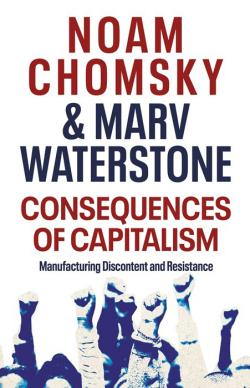 Covid-19 has revealed glaring failures and monstrous brutalities in the current capitalist system. It represents both a crisis and an opportunity. Everything depends on the actions that people take into their own hands.’
Covid-19 has revealed glaring failures and monstrous brutalities in the current capitalist system. It represents both a crisis and an opportunity. Everything depends on the actions that people take into their own hands.’
How does politics shape our world, our lives and our perceptions? How much of ‘common sense’ is actually driven by the ruling classes’ needs and interests? And how are we to challenge the capitalist structures that now threaten all life on the planet?
Consequences of Capitalism exposes the deep, often unseen connections between neoliberal ‘common sense’ and structural power. In making these linkages, we see how the current hegemony keeps social justice movements divided and marginalized. And, most importantly, we see how we can fight to overcome these divisions.
Is our “common sense” understanding of the world a reflection of the ruling class’s demands of the larger society? If we are to challenge the capitalist structures that now threaten all life on the planet, Chomsky and Waterstone forcefully argue that we must look closely at the everyday tools we use to interpret the world. Consequences of Capitalism make the deep, often unseen connections between common sense and power. In making these linkages we see how the current hegemony keep social justice movements divided and marginalized. More importantly, we see how we overcome these divisions.
“Covid-19 has revealed glaring failures and monstrous brutalities in the current capitalist system. It represents both a crisis and an opportunity. Contests for controlling the narratives around the meaning of this pandemic will be the terrain of struggle for either a new, more humane common sense and society or a return to the status quo ante. The outcome of those contests is uncertain; everything depends on the actions that people take into their own hands.” (From the Afterword)
Noam Chomsky was born in Philadelphia, Pennsylvania, on December 7, 1928. He studied linguistics, mathematics, and philosophy at the University of Pennsylvania. In 1955, he received his Ph.D. from the University of Pennsylvania. Chomsky is Institute Professor (emeritus) in the Department of Linguistics and Philosophy at the Massachusetts Institute of Technology and Laureate Professor of Linguistics and Agnese Nelms Haury Chair in the Program in Environment and Social Justice at the University of Arizona. His work is widely credited with having revolutionized the field of modern linguistics. Chomsky is the author of numerous best-selling political works, which have been translated into scores of countries worldwide. Among his most recent books are Hegemony or Survival, Failed States, Who Rules the World-yet, Requiem for the American Dream, and What Kind of Creatures Are We?
Marv Waterstone is Professor Emeritus in the School of Geography and Development at the University of Arizona, where he has been a faculty member for over 30 years. He is also the former director of the University of Arizona Graduate Interdisciplinary Program in Comparative Cultural and Literary Studies. His research and teaching focus on the Gramscian notions of hegemony and common sense, and their connections to social justice and progressive social change. His most recent books are Wageless Life: A Manifesto for a Future beyond Capitalism (University of Minnesota Press; co-authored with Ian Shaw) and Geographic Thought: A Praxis Perspective (Routledge; co-edited with George Henderson).
Consequences of Capitalism:
Manufacturing Discontent and Resistance
by Noam Chomsky (Author),
Marv Waterstone (Author)
Publisher: Haymarket Books
Language: English
400 pages
Publication date: 01/05/2021
ISBN-13: 978-1642594010
Hardcover $65.00
ISBN-13: 978-1642592634
Paperback $19.95
# more non fiction
Consequences of Capitalism:
Manufacturing Discontent and Resistance
by Noam Chomsky (Author),
Marv Waterstone (Author)
• fleursdumal.nl magazine
More in: - Book Lovers, - Book Stories, Archive C-D, Archive W-X, DRUGS & DISEASE & MEDICINE & LITERATURE, MONTAIGNE, Noam Chomsky, Workers of the World
Vanwege de roem die hem al bij leven ten deel viel, weten we over Dante Alighieri (ca. 1265 – 1321) meer dan over de meeste van zijn tijdgenoten.
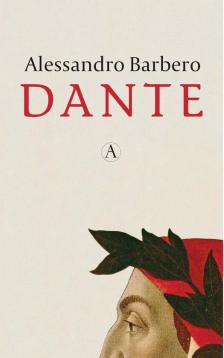 We volgen de later wereldberoemde dichter vanaf zijn adolescentie: als de zoon van een woekeraar, die ervan droomt tot de wereld van edelen en schrijvers te behoren. We zien hem in de donkere wandelgangen van de corrupte politiek en tijdens zijn ballingschap, waarin hij de verscheidenheid van veertiende-eeuws Italië ontdekt.
We volgen de later wereldberoemde dichter vanaf zijn adolescentie: als de zoon van een woekeraar, die ervan droomt tot de wereld van edelen en schrijvers te behoren. We zien hem in de donkere wandelgangen van de corrupte politiek en tijdens zijn ballingschap, waarin hij de verscheidenheid van veertiende-eeuws Italië ontdekt.
Historicus Alessandro Barbero plaatst de schepper van De goddelijke komedie in zijn tijd, cultuur en maatschappelijke context. Dante is daarmee niet alleen een portret van een dichter; het boek biedt een volledig beeld van een man die vat probeert te krijgen op macht, geld, oorlog, familie, vriendschap en liefde.
Alessandro Barbero is een van de vooraanstaandste historici van Italië. Zijn werk wordt internationaal gepubliceerd. Hij doceert Middeleeuwse Geschiedenis aan de universiteit van Piedmont Orientale in Vercilli. Tot zijn bekendste werken behoren Waterloo en Het mooie leven en de oorlogen van anderen, waarvoor hij de Premio Strega ontving.
#new books
Dante
Alessandro Barbero
Vertaler: Etta Maris
Paperback
Ingenaaid
Nederlands
Uitgever Athenaeum
Druk 1
Verschenen sep. 2021
Bladzijden: 384
Genre: Biografieen literaire auteurs
EAN 9789025313432
Afmetingen 216 x 136 x 31 mm
€ 27,50
• fleursdumal.nl magazine
More in: #Biography Archives, - Book News, Archive A-B, Archive C-D, Archive C-D, Dante Alighieri, MONTAIGNE, TOMBEAU DE LA JEUNESSE - early death: writers, poets & artists who died young
Erasmus is een van de grootste auteurs van Nederland en België, en zelfs van heel Europa.
Hij verpersoonlijkt de overgang van de middeleeuwen naar de moderne tijd. Zijn betekenis voor de literatuur- én wetenschapsgeschiedenis is immens.
Erasmus’ duizenden brieven over onderwerpen als gewetensdwang en drukpersvrijheid hebben niets aan zeggingskracht ingeboet.
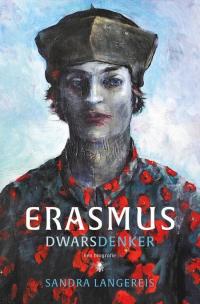 Het grootste deel van Erasmus’ leven en werk bleef tot nu toe onderbelicht. Sandra Langereis is de eerste biograaf die zijn levensverhaal recht doet door zijn enorme briefwisseling op de voet te volgen en de wording van zijn complete literaire erfenis te beschrijven. Ze toont hem als de sprankelende auteur van de Lof der zotheid en als brutale bijbel-wetenschapper die het net zo hevig aan de stok kreeg met inquisiteurs als met Luther.
Het grootste deel van Erasmus’ leven en werk bleef tot nu toe onderbelicht. Sandra Langereis is de eerste biograaf die zijn levensverhaal recht doet door zijn enorme briefwisseling op de voet te volgen en de wording van zijn complete literaire erfenis te beschrijven. Ze toont hem als de sprankelende auteur van de Lof der zotheid en als brutale bijbel-wetenschapper die het net zo hevig aan de stok kreeg met inquisiteurs als met Luther.
Erasmus’ levensverhaal werpt licht op een bewogen tijdvak: een eeuw van felle humor en grof geweld, van religieus fanatisme en strijd voor intellectuele vrijheid. Deze rijke biografie maakt de actualiteit van geschiedenis invoelbaar.
Nooit kwam Erasmus geestiger, slimmer, scherper, dapperder, dwarser, bozer, banger en, in één woord, menselijker in beeld. En niet eerder werd Erasmus’ tijd levendiger voor het voetlicht gebracht dan in deze biografie. Een indringend en ongekend compleet portret van Erasmus.
Sandra Langereis is historicus, biograaf en schrijver. Haar vorige biografie, De woordenaar, over drukker en uitgever Christoffel Plantijn, werd genomineerd voor de Libris Geschiedenis Prijs en door de Volkskrant en Trouw verkozen tot beste biografie en beste geschiedenisboek van 2014.
Dit jaar ontvangt Sandra Langereis de Libris Geschiedenis Prijs 2021 voor haar boek over Erasmus.
 ‘Een boek dat’, aldus de jury, ‘op alle fronten uitblinkt. Een boek dat stoelt op briljant wetenschappelijk onderzoek, dat ondanks zijn omvang tot aan het eind toe meeslepend is, een boek dat je omver blaast.’ Juryvoorzitter Khadija Arib maakte de prijswinnaar van het beste historische boek van 2021 bekend tijdens een speciale live-uitzending van radioprogramma OVT. Aan de Libris Geschiedenis Prijs is een bedrag van 20.000 euro verbonden.
‘Een boek dat’, aldus de jury, ‘op alle fronten uitblinkt. Een boek dat stoelt op briljant wetenschappelijk onderzoek, dat ondanks zijn omvang tot aan het eind toe meeslepend is, een boek dat je omver blaast.’ Juryvoorzitter Khadija Arib maakte de prijswinnaar van het beste historische boek van 2021 bekend tijdens een speciale live-uitzending van radioprogramma OVT. Aan de Libris Geschiedenis Prijs is een bedrag van 20.000 euro verbonden.
De Libris Geschiedenis Prijs bekroont historische boeken die een algemeen publiek aanspreken. Oorspronkelijkheid, leesbaarheid en historische degelijkheid zijn de belangrijkste criteria. De prijs is een initiatief van Historisch Nieuwsblad, Libris, Nederlands Openluchtmuseum, Rijksmuseum Amsterdam, VPRO en Trouw. De prijs is onderdeel van de Maand van de Geschiedenis en wordt traditiegetrouw eind oktober uitgereikt, dit jaar alweer voor de vijftiende keer. Met deze prijs willen de initiatiefnemers een stimulans geven aan het goede historische boek in Nederland.
 De Libris Geschiedenisprijs wordt elk jaar uitgereikt aan de auteur van een historisch boek dat een algemeen publiek aanspreekt. Het boek moet een oorspronkelijk onderwerp hebben, prettig leesbaar zijn en op gedegen historisch onderzoek stoelen. Aan de prijs is een bedrag van € 20.000,- verbonden. Eerder wonnen Pieter van Os (2020), Roelof van Gelder (2019), Frits van Oostrom (2018), Carolijn Visser (2017), Elisabeth Leijnse (2016), Alexander Münninghoff (2015), Dik van der Meulen (2014), Martin Bossenbroek (2013), Bart van den Boom (2012), Jaap Scholten (2011), David Van Reybrouck (2010), Jolande Withuis (2009), Luuc Kooijmans (2008) en Auke van der Woud (2007) de prijs.
De Libris Geschiedenisprijs wordt elk jaar uitgereikt aan de auteur van een historisch boek dat een algemeen publiek aanspreekt. Het boek moet een oorspronkelijk onderwerp hebben, prettig leesbaar zijn en op gedegen historisch onderzoek stoelen. Aan de prijs is een bedrag van € 20.000,- verbonden. Eerder wonnen Pieter van Os (2020), Roelof van Gelder (2019), Frits van Oostrom (2018), Carolijn Visser (2017), Elisabeth Leijnse (2016), Alexander Münninghoff (2015), Dik van der Meulen (2014), Martin Bossenbroek (2013), Bart van den Boom (2012), Jaap Scholten (2011), David Van Reybrouck (2010), Jolande Withuis (2009), Luuc Kooijmans (2008) en Auke van der Woud (2007) de prijs.
Erasmus: dwarsdenker
Een biografie
Auteur: Sandra Langereis
ISBN: 9789403120317
NUR: 321
Gebonden
Aantal pagina’s: 784
Uitgever: De Bezige Bij
Verschijningsdatum: 04-03-2021
Prijs: 39,99
• fleursdumal.nl magazine
More in: #Biography Archives, - Book News, - Bookstores, Archive E-F, Awards & Prizes, Desiderius Erasmus, MONTAIGNE
Our Bodies, Their Battlefield: What War Does to Women by Christina Lamb
From Christina Lamb, the coauthor of the bestselling I Am Malala and an award-winning journalist—an essential, groundbreaking examination of how women experience war.
In Our Bodies, Their Battlefields, longtime intrepid war correspondent Christina Lamb makes us witness to the lives of women in wartime. An award-winning war correspondent for twenty-five years (she’s never had a female editor) Lamb reports two wars—the “bang-bang” war and the story of how the people behind the lines live and survive. At the same time, since men usually act as the fighters, women are rarely interviewed about their experience of wartime, other than as grieving widows and mothers, though their experience is markedly different from that of the men involved in battle.
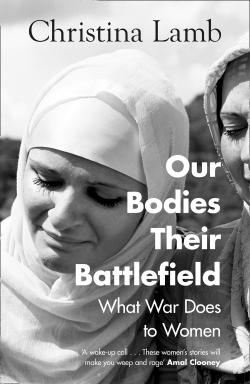 Lamb chronicles extraordinary tragedy and challenges in the lives of women in wartime. And none is more devastating than the increase of the use of rape as a weapon of war. Visiting warzones including the Congo, Rwanda, Nigeria, Bosnia, and Iraq, and spending time with the Rohingya fleeing Myanmar, she records the harrowing stories of survivors, from Yazidi girls kept as sex slaves by ISIS fighters and the beekeeper risking his life to rescue them; to the thousands of schoolgirls abducted across northern Nigeria by Boko Haram, to the Congolese gynecologist who stitches up more rape victims than anyone on earth. Told as a journey, and structured by country, Our Bodies, Their Battlefields gives these women voice.
Lamb chronicles extraordinary tragedy and challenges in the lives of women in wartime. And none is more devastating than the increase of the use of rape as a weapon of war. Visiting warzones including the Congo, Rwanda, Nigeria, Bosnia, and Iraq, and spending time with the Rohingya fleeing Myanmar, she records the harrowing stories of survivors, from Yazidi girls kept as sex slaves by ISIS fighters and the beekeeper risking his life to rescue them; to the thousands of schoolgirls abducted across northern Nigeria by Boko Haram, to the Congolese gynecologist who stitches up more rape victims than anyone on earth. Told as a journey, and structured by country, Our Bodies, Their Battlefields gives these women voice.
We have made significant progress in international women’s rights, but across the world women are victimized by wartime atrocities that are rarely recorded, much less punished. The first ever prosecution for war rape was in 1997 and there have been remarkably few convictions since, as if rape doesn’t matter in the reckoning of war, only killing. Some courageous women in countries around the world are taking things in their own hands, hunting down the war criminals themselves, trying to trap them through Facebook.
In this profoundly important book, Christina Lamb shines a light on some of the darkest parts of the human experience—so that we might find a new way forward. Our Bodies, Their Battlefields is as inspiring and empowering is as it is urgent, a clarion call for necessary change.
Christina Lamb is one of Britain’s leading foreign correspondents and a bestselling author. She has reported from most of the world’s hotspots starting with Afghanistan after an unexpected wedding invitation led her to Karachi in 1987 when she was just 22. She moved to Peshawar to cover the mujaheddin fighting the Soviet Union and within two years she had been named Young Journalist of the Year. Since then she has won 15 major awards including five times being named Foreign Correspondent of the Year and Europe’s top war reporting prize, the Prix Bayeux. She was made an OBE by the Queen in 2013 and is an honorary fellow of University College, Oxford.
Our Bodies, Their Battlefield:
What War Does to Women
by Christina Lamb
Publisher: William Collins
5 Mar. 2020
Language: English
Hardcover: 432 pages
ISBN-10: 0008300003
ISBN-13: 978-0008300005
£14.99
• fleursdumal.nl magazine
More in: - Book Stories, - Bookstores, Archive K-L, Feminism, MONTAIGNE, WAR & PEACE

This week, the Ministry of Justice in Belarus sent a letter indicating they are seeking to liquidate our sister organization PEN Belarus, which for years has supported writers and free expression in the country. It comes as the country’s authoritarian leader Aleksandr Lukashenka continues to crack down on all those who dissent. Show our colleagues and friends at PEN Belarus that they are not alone—and that we rally to support the freedom to write wherever and whenever it comes under threat.
Please join us and take action
Click here:
https://actionnetwork.org/petitions/i-support-pen-belarus?source=email&
Show your support for PEN Belarus.
Thank You!
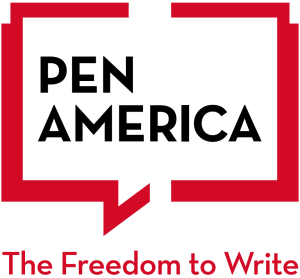 PEN America stands at the intersection of literature and human rights to protect free expression in the United States and worldwide. They champion the freedom to write, recognizing the power of the word to transform the world. Their mission is to unite writers and their allies to celebrate creative expression and defend the liberties that make it possible.
PEN America stands at the intersection of literature and human rights to protect free expression in the United States and worldwide. They champion the freedom to write, recognizing the power of the word to transform the world. Their mission is to unite writers and their allies to celebrate creative expression and defend the liberties that make it possible.
Founded in 1922, PEN America is the largest of the more than 100 centers worldwide that make up the PEN International network. PEN America works to ensure that people everywhere have the freedom to create literature, to convey information and ideas, to express their views, and to access the views, ideas, and literatures of others.
More information on PEN America, click here
• fleursdumal.nl magazine
More in: AUDIO, CINEMA, RADIO & TV, MONTAIGNE, MUSEUM OF PUBLIC PROTEST, PEN Actions, PRESS & PUBLISHING, REPRESSION OF WRITERS, JOURNALISTS & ARTISTS
Thank you for reading Fleurs du Mal - magazine for art & literature